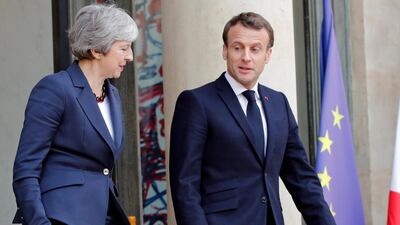The latest delay to Brexit will not incentivise firms to invest further in UK companies, but will instead add to the uncertainty and prolong weak economic growth, according to senior economists at European banks.
“This latest delay solves nothing and won’t be an incentive for firms to invest or call off their contingency plans. This delay merely points to lastingly weak growth,” Rene Defossez, senior economist at French lender Natixis said.
On Wednesday, British prime minister Theresa May was granted an extension to the Brexit deadline from April 12 to October 31 at an EU summit in Brussels, Belgium. Although many investors welcomed the news, the impasse was far from resolved and a general election began to look more likely.
“Brexit is much like a computer virus: it is causing malfunctions to the UK’s economic and political ‘programs’,” said Mr Defossez in a report. “Yesterday’s European Summit has not really acted as an anti-virus: the political situation in the United Kingdom remains deadlocked and the country’s economy will continue to suffer from Brexit-related uncertainties.”
Business investment, which has declined over the last year, is the main casualty of Brexit uncertainty, the French bank said. The Bank of England’s investment intentions have fallen to their lowest level since 2010 in the manufacturing sector.
In Britain’s services sector, investment intentions have also declined, now being nearly at their lowest level since the 2016 referendum.
“The spectre of a cliff edge has not disappeared after yesterday’s summit, and no one has any inkling as to the type of trade agreement, supposing there is even one, that will govern trade exchanges between the EU27 and the UK,” said Mr Defossez.
The services sector is heavily exposed to Brexit. The United Kingdom Services Purchasing Managers Index (PMI), which indicates whether the industry is expending (if the score is over 50) or shrinking (if the score is under 50), has fallen below 50 for the first time since the 2016 referendum. This fall indicates a crisis of confidence in the UK services industry.
The slump prompted the Confederation of British Industry’s (CBI) Chief Economist to warn: “Brexit is now a national emergency. No Deal has to be clearly ruled out, then MPs must finally compromise and deliver a solution that protects jobs, livelihoods and communities across the UK”.
The UK is a major exporter of services. The trade surplus generated by services helps offset partly the significant trade deficit generated by goods (£14.1 billion in February), hence limit the overall trade deficit (£5.8 billion in February).
In the event of a no-deal Brexit, the surplus generated by services will struggle to offset the deficit for goods, meaning that the overall trade deficit could deepen. This has been happening in recent months, as firms prepare for a hard-Brexit scenario and stockpile resources in anticipation of major disruptions to supply chains.
Analysts at Swiss bank UBS said that the deadline extension was welcomed by the markets, but said that delay “does not resolve the Brexit impasse” and a general election now looks like the best solution.
“The cloud of uncertainty that has weighed on households and firms since the referendum is unlikely to lift,” said the bank’s Chief Investment Office in a briefing. “Sluggish economic growth is likely to continue until the impasse is broken. We do not advocate taking directional views in sterling, as a general election would most likely keep sterling volatile and stuck near current levels.”
UBS said that although investors will be relieved that no-deal Brexit had been taken off the table for the time being, the deadline extension would only lead to “a modest recovery in sterling”.
The bank added: “Growth data for the first quarter has been better than expected but part of this surge in activity can be attributed to preparing for Brexit (stockpiling). As this unwinds, it is unlikely that the economy can sustain the momentum. A resilient economy has been the main reason for our call that the Bank of England will raise interest rates later this year. While we continue to believe this will be the case, a prolonged period of uncertainty weakens this argument.”
The bank added that it did not advocate taking directional views on the pound at this stage.

